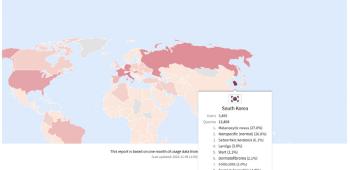The world's first demonstration of the recovery and pain improvement effect of single-hole robotic surgery for esophageal cancer
May 03, 2025
Korean researchers have proven for the first time in the world that single-hole robotic surgery in esophageal cancer surgery is faster to recover and less pain than conventional surgery.
Professor Kim Hyun-gu, Lee Joon-hee, Koo Byeong-mo, and Jang Yu-jin of the gastrointestinal surgery at Korea University Guro Hospital evaluated the clinical usefulness and safety of single-hole robotic esophageal surgery and published the results of comparison with the existing surgical methods such as multi-open robotic surgery and thoracoscopic surgery in the recent issue of the international journal oncology 'Cancers'.
Despite advances in various treatments, esophageal cancer has a low 5-year survival rate of less than 20%. In particular, esophageal cancer surgery is considered a high-level surgery, and the research team has continued to develop esophageal cancer surgery by reporting the world's first single-hole robot esophageal cancer surgery to the European Journal of Cardiothoracic Surgery in 2023.
This study was conducted to demonstrate the clinical usefulness and applicability of single-hole robotic esophageal cancer surgery. The research team conducted a retrospective analysis of 53 patients who underwent surgery for esophageal cancer at Korea University Guro Hospital from February 2017 to December 2024. We compared and analyzed the incidence of postoperative complications, duration of chest tube maintenance, length of hospital stay, and postoperative pain by categorizing them into a single-hole (SP) robotic surgery group (17 patients), a multi-hole robotic surgery group (13 patients), and a patient group (23 patients) who underwent thoracoscopic surgery.
As a result, the single-hole robotic surgery group had statistically significantly shorter postoperative chest tube maintenance period compared to the thoracoscopic surgery group, and the postoperative peak pain indicating the severity of pain was also significantly lower. In addition, the hospitalization period was short by an average of 5 days, and overall, the recovery of the single robotic surgery group was found to be stable. There were no cases of transition from single-pore robotic surgery group to thoracotomy and thoracoscopic surgery, and comparable results were obtained in terms of safety and effectiveness compared to multi-pore robotic surgery group and thoracoscopic surgery group.
Professor Lee Jun-hee, the first author of the paper, "If long-term effects and safety verification continue in the future, it is expected that single-hole robotic surgery will greatly contribute to improving the quality of life of patients.", explaining the significance of the study.
Professor Koo Byung-mo, co-author of the first author, emphasized that "It is meaningful to provide a basis for the wider use of single-hole robotic surgery that maximizes the advantages of a minimally invasive approach in the future."
Co-author Professor Chang Yu-jin "Single-hole robotic surgery has shown the potential to develop into standard treatments in the future, while providing a safer surgical environment for patients."This laid the groundwork for providing patients with an improved treatment experience." he evaluated.
Lead author Professor Kim Hyun-koo said, "This study is the first case in the world to demonstrate the clinical feasibility and practical benefits of esophagectomy using a single-hole robotic system. The findings show the possibility that single-hole robotic surgery will become a new standard surgical method for esophageal cancer surgery in the future."
Professor Kim Hyun-gu, Lee Joon-hee, Koo Byeong-mo, and Jang Yu-jin of the gastrointestinal surgery at Korea University Guro Hospital evaluated the clinical usefulness and safety of single-hole robotic esophageal surgery and published the results of comparison with the existing surgical methods such as multi-open robotic surgery and thoracoscopic surgery in the recent issue of the international journal oncology 'Cancers'.
Despite advances in various treatments, esophageal cancer has a low 5-year survival rate of less than 20%. In particular, esophageal cancer surgery is considered a high-level surgery, and the research team has continued to develop esophageal cancer surgery by reporting the world's first single-hole robot esophageal cancer surgery to the European Journal of Cardiothoracic Surgery in 2023.
This study was conducted to demonstrate the clinical usefulness and applicability of single-hole robotic esophageal cancer surgery. The research team conducted a retrospective analysis of 53 patients who underwent surgery for esophageal cancer at Korea University Guro Hospital from February 2017 to December 2024. We compared and analyzed the incidence of postoperative complications, duration of chest tube maintenance, length of hospital stay, and postoperative pain by categorizing them into a single-hole (SP) robotic surgery group (17 patients), a multi-hole robotic surgery group (13 patients), and a patient group (23 patients) who underwent thoracoscopic surgery.
As a result, the single-hole robotic surgery group had statistically significantly shorter postoperative chest tube maintenance period compared to the thoracoscopic surgery group, and the postoperative peak pain indicating the severity of pain was also significantly lower. In addition, the hospitalization period was short by an average of 5 days, and overall, the recovery of the single robotic surgery group was found to be stable. There were no cases of transition from single-pore robotic surgery group to thoracotomy and thoracoscopic surgery, and comparable results were obtained in terms of safety and effectiveness compared to multi-pore robotic surgery group and thoracoscopic surgery group.
Professor Lee Jun-hee, the first author of the paper, "If long-term effects and safety verification continue in the future, it is expected that single-hole robotic surgery will greatly contribute to improving the quality of life of patients.", explaining the significance of the study.
Professor Koo Byung-mo, co-author of the first author, emphasized that "It is meaningful to provide a basis for the wider use of single-hole robotic surgery that maximizes the advantages of a minimally invasive approach in the future."
Co-author Professor Chang Yu-jin "Single-hole robotic surgery has shown the potential to develop into standard treatments in the future, while providing a safer surgical environment for patients."This laid the groundwork for providing patients with an improved treatment experience." he evaluated.
Lead author Professor Kim Hyun-koo said, "This study is the first case in the world to demonstrate the clinical feasibility and practical benefits of esophagectomy using a single-hole robotic system. The findings show the possibility that single-hole robotic surgery will become a new standard surgical method for esophageal cancer surgery in the future."
|
This article was translated by Naver AI translator.














